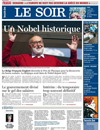
On October 8, Belgian François Englert, of the Université Libre de Bruxelles, age 80, and British scientist Peter Higgs of the University of Edinburgh, age 84, were awarded the 2013 Nobel Prize in Physics for their research on the Higgs boson.
The particle, whose existence was confirmed in 2012 by the European Organisation for Nuclear Research (CERN) is “the keystone of the fundamental structure of matter, the basic particle which explains […] why some particles have mass and not others, and why the universe as we know it exists,” explains Le Soir.
For the daily, the prize —
… is fabulously important for two reasons: it honours pure research in a country […] which increasingly takes the view that budgets should be attributed to researchers who find rather than those who seek. […] It commends complexity and obliges us to acknowledge it.
Was this article useful? If so we are delighted!
It is freely available because we believe that the right to free and independent information is essential for democracy. But this right is not guaranteed forever, and independence comes at a cost. We need your support in order to continue publishing independent, multilingual news for all Europeans.
Discover our subscription offers and their exclusive benefits and become a member of our community now!











